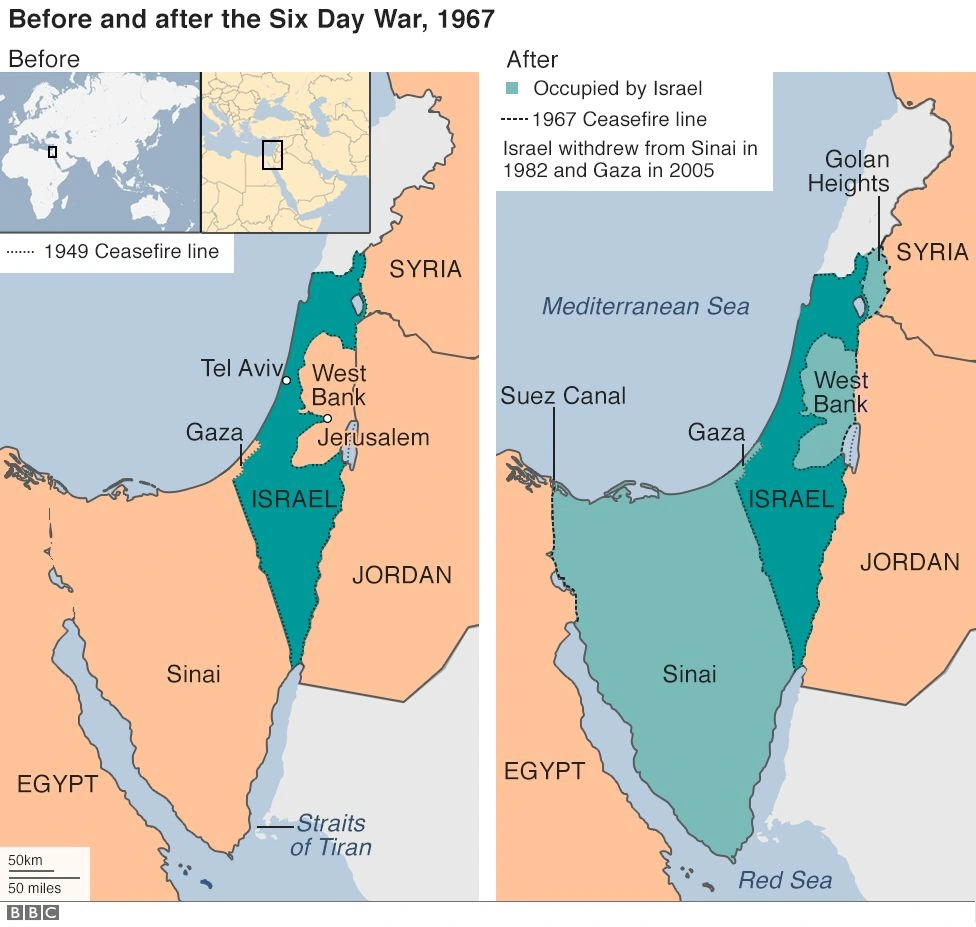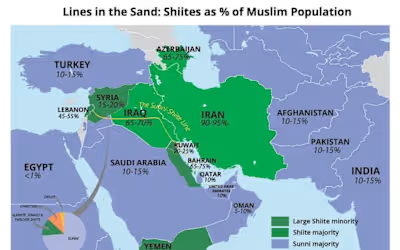Why does the United States support Israel? How it all started.
U.S. support for Israel
The first part of understanding U.S. support for Israel, regardless of which iteration of the Israel-Palestine conflict we face, is best done by following the money. An interactive graph showing the figures for U.S. aid to Israel from 1952-present is available here.
Despite the fact that we often hear that these nations have shared an unwavering 75 year alliance, in reality, U.S. support for Israel as we know it today really only began after events in 1967 and 1970, with prior economic and security collaboration being less remarkable. The U.S. financial support to Israel skyrocketed in the early 1970s and the precipitating events to this aid increase hold the answers to this dramatic shift in U.S.-Israeli diplomatic relations.
The alignment of American foreign policy and Israeli foreign policy was reinforced during the Six-Day war in 1967 and again in the events of Black September 1970. A brief dive into these two geopolitical events is essential for understanding the alliances at play in the current Israel-Palestine conflict.
1967: Israel does the U.S. a favor
In 1967, Egyptian President Gamal Abdel Nasser was nationalizing Egypt’s resources including the Straits of Tiran, the only passage through which Israel was receiving oil at the time and therefore, an imperative trade route for Israel’s economy. Nasser’s Egypt spearheaded what was a burgeoning movement of secular nationalism in the Middle East which threatened U.S economic interests. Just as Iran did with oil in 1953, Guatemala did with fruit production in 1954, and countless other instances, a country threatened to take their own natural resources back from foreign powers in order to benefit their own population, and America was unimpressed.
At the time, Nasser’s Arab nationalism movement was threatening to spread around the Middle East. You might say, isn’t secular nationalism in the Middle East a good thing? Would that not be better for peace and geopolitical relations than radical Islamist governments ruling the region? Well, the answer to those questions for most is yes, but not for America.
A secular nationalist movement such as in Iran in the early 1950’s jeopardizes U.S. economic interests. If the ideology behind Nasser’s Egyptian Revolution would take hold elsewhere in the Middle East such as in Saudi Arabia, the United States oil supplies and investments in Middle Eastern economies would unquestionably come under fire. The austere theocratic regimes in the Levant provide the United States with less resistance to their political and economic objectives than an organized nationalist movement unmarred by theocratic dogmas.
From the funding of radical Wahhabism in Saudi Arabia, to ISIS affiliates in Syria and beyond, the U.S. often claims to be supporting these groups so as to combat Russian influence in the region. Even if this is true, the overt efforts to retain control over the region by funding radical ideologues and terrorists is too brazen to simply be an anti-Russian security strategy. Moreover, this U.S. interventionism can almost always be traced back to jeopardized economic interests, such as the competing natural gas pipelines in the Syrian civil war requiring a U.S.-Saudi-Qatari offensive to bring about regime change.
Back to 1967. The tension between Islamist organization the Muslim Brotherhood, lead by Islamic scholar Sayyid Qutb, and the secular nationalist movement in Egypt lead by Nasser, was palpable, with the Muslim Brotherhood even attempting to assassinate Nasser on more than one occasion. Nasser was a thorn in the craw of the United States and their desire for subservience in the region. By the 1960s, the Arab nationalist movement had now toppled monarchies in Iraq, Egypt and Yemen. At this point Saudi Arabia feared the winds of revolution reaching their shores. The kingdom were fighting a proxy war in Yemen where Egyptian troops were backing the Republican government and South Yemeni prime minister Faysal al-Shaabi was supporting the Royalists. “The United Kingdom and Israel were also clandestinely supporting the Royalists. America was on the sidelines”according to U.S. Security expert Bruce Riedel of the Brookings Institution. America was far too occupied by the their calamitous intervention is South east Asia to play a role at the time.
This proxy war in Yemen was the proverbial ideological battleground of the Arab Cold War. Whoever prevailed would have the power and and cache to influence the future socio-political direction of the region. After Israel’s pre-emptive strikes decimated Egypt’s Airforce in the six day war of 1967, it effectively ended Nasser’s fight in Yemen, delivering a devastating blow to the Arab nationalism movement much to the delight of Western Allies. By succeeding in thwarting this threat to U.S. interests, Israel now ingratiated themselves to the American Security apparatus in a way that had not been the case previous. This event was the fist of two key favors that the Israeli’s would do for the Americans in a three year period, with the second favor being much more of a direct request than what happened in 1967.
1970: Israel helps the U.S. again during Black September
In 1970 Israel’s role in Black September would cement their place in the cadre of U.S. Security Allies. The events of June 1967 had brought to boil the cauldron of Arab-Israeli hate again after Israel’s expansionist victory. “Israel’s decisive victory included the capture of the Sinai Peninsula, Gaza Strip, West Bank, Old City of Jerusalem, and Golan Heights, and in turn, lead to the displacement of over 300,000 Palestinian Arabs, of which 245,000 fled to Jordan. By 1970 some two thirds of the Jordanian population were Palestinian.

In the subsequent years after the mass exodus, this large contingent of Palestinians in Jordan began to cause unrest in the nation. The Palestinian Liberation Organization (PLO) launched attacks against Israel from Jordan in tandem with Egypt during the 1969 War of Attrition, and challenged Hussein’s throne. King Hussein was a close ally of Britain and the US. He had also maintained amicable relations and a secret peace with Israel during the 1950s and 1960s but now had to tread carefully. It was essential to quell the Palestinian radicals without indicating any allegiance to Israel or the West.
The civil war therefore broke out between the Jordanian army and the PLO, leading to three failed assassination attempts on Hussein, the third of which was nearly successful as militants opened fire on his motorcade. Hussein’s Hashemite dynasty was under threat as was a key US ally, and in the eyes of the West the fall of the Hashemite dynasty would be disastrous. Their worst fears were realized when on September 19th elements of the Syrian army crossed the northern Jordanian border to aid the PLO. Hussein was surrounded and the US made a “revolutionary decision and turned to Israel for help.”
Again the Americans were unable to provide logistical support as they were preoccupied in Vietnam and the Nixon administration rightfully did not want to over extend themselves militaristically with a second kinetic war in Asia. Henry Kissinger, after a discussion with Nixon, told Israeli Prime Minister Golda Meir that the U.S. “would look favorably on an Israeli air strike” on the advancing Syrians. The always coy Kissinger knew how to play the complex linguistic gymnastics of high stakes international diplomacy. The statement was more of a quid pro quo than an official request, but he understood that the perlocutionary effect of his utterance would be capitulation by Israel. Indeed this was the result, Israel’s strikes allowed the Jordanian army to drive out the PLO by July 1971.
America was “fortunate in having an ally like Israel in the Middle East” Kissinger told Israel’s Ambassador to the United States Yitzhak Rabin after the military success. Israel had proved to be a valuable ally for the US. Their bond was fortified and the subsequent surge in aid was Israel’s recompense. Kissinger ‘s famous quote aptly describing the volatility of the region’s conflicts and borders still rings true, “Throughout history, the boundaries in the Middle East have moved with the shifting sands.” The events of 1970 were however an indelible line in the proverbial sand, after which US support for Israel would never waver.
Thanks for reading Devin’s Substack! Subscribe for free to receive new posts and support my work.
Like this project
Posted Nov 17, 2023
The Israeli favors that garnered unwavering support from the U.S.
Likes
0
Views
12




